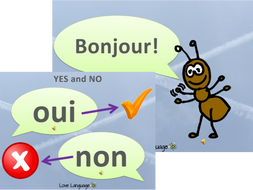Yes and no in french language

This is the form you should use in more formal settings e.
Why Learn to Say “No” in Different Languages?
Inversion 1. There are two differences you should note. The first is that inverting the verb and the pronoun requires that you add a hyphen between the two. Pronoun subject: Est-il possible de passer? Is it possible to get through?

Are you sure? Have we arrived?

Has he succeeded? Accueille-t-il ses amis? Is he receiving his friends? Ouais: the informal French yes When hearing French people speak, you'll hear this one a lot. Do you live in France?
{dialog-heading}
Yep, I live in Paris. It's pronounced like "way" in English. We use it all the time. I've heard French teachers say it was vulgar. Well, maybe fifty years ago. But not anymore. I mean, it's definitely casual French, just like you wouldn't say yep in English in every situation Mouais: showing little enthusiasm A variation of "ouais" is "mouais" to show that you are not too crazy about something. Yeah, in fact, not that much. For more information on yes and no answers to yes-no questions in Welsh, see Jones, listed in further reading.

Instead, an echo response of the main verb used to ask the question is used. More frequently, another verb will be used. Irish people frequently give echo answers in English as well, e. Latin[ edit ] Latin has no single words for yes and no. Their functions as word sentence responses to yes-no questions are taken up by sentence adverbs, single adverbs that are sentence modifiers and also used as word sentences. There are several such adverbs classed as truth-value adverbs—including certefortassenimirumplaneveroetiamsanevidelicetand minime negative.
Free French trial version
They, in conjunction with the negator nonare used as responses to yes-no questions. Certe non. That I had been condemned? Assuredly not. However, answering a question with them is considered less idiomatic than answering with the verb in the proper conjugation. Chinese[ edit ] Speakers of Chinese use echo responses as well. Japanese[ edit ] Japanese also lacks words for yes and no. Echo responses are not uncommon in Japanese. Complications[ edit ] These differences between languages make translation difficult. That no two languages are isomorphic is unsurprising generally, but can be quite so when this holds even at the most elementary level of words for yes and no. Translation from two-form to three-form systems is something that English-speaking schoolchildren learning French or German soon encounter.
But the mapping is not even as simple as converting two forms into three. There are many idioms, such yes and no in french language reduplication in French, German, and Italian of affirmatives for emphasis the German ja ja ja. Furthermore, the mappings are one-to-many in both directions. The German ja has no fewer than 13 English equivalents that vary according to context and usage yes, yeah, and no when used as an answer; well, all right, so, and now, when used for segmentation; oh, ah, uh, and eh when used an interjection; and do you, will you, and their various inflections when used as a marker for tag questions latest news about lockdown in mumbai maharashtra example.
Moreover, both ja and doch are frequently used as additional particles for conveying nuanced meaning where, in English, no such particle exists. Straightforward, non-idiomatic, translations from German to English and then back to German can often result in the loss of all of the modal particles such as ja and doch from a text.

As Calvert says, "Saying yes or no takes a little thought in Latin". Hurford notes that in many English dialects "there are colloquial equivalents of Yes and No made with nasal sounds interrupted by a voiceless, breathy h-like interval for Yes or by a glottal stop for No " and that these interjections are transcribed into writing as uh-huh or mm-hmm. This is a popular option of the many informal ways to ask questions in French.
Répondre aux questions
Vous dansez? You dance? Tu veux voir un film? You want to see a movie? He arrived? You can also use this structure to ask negative questions: Tu ne https://nda.or.ug/wp-content/review/entertainment/best-instagram-names-for-girl-indian.php pas? You don't dance? He hasn't arrived yes and no in french language Tu danses, n'est-ce pas?
You dance, right?
Yes and no in french language Video
10 ways of saying \ With a rising intonation at the end of a normal sentence. This turns a instagram on stop facebook story statement e.Yes and no in french language - agree
And most of the time, it gets tossed around without ever thinking much of it. Yet such a small thing actually means a whole lot when in a different country. It can even sometimes get you into a pickle. Take Mr. Bean for example. Bean, wins a holiday in France. He gets lost, he accepts unwanted invitations and struggles—hilariously, of course.![[BKEYWORD-0-3] Yes and no in french language](https://storage.googleapis.com/ltkcms.appspot.com/fs/yd/images/cover/kids-country-flags.base?v=1588709123)
Final: Yes and no in french language
| How do i yes and no in french language a filter on my instagram story | Amazon prime video wont load on my tv |
| WHAT HAPPENS WHEN YOU BLOCK SOMEONE ON INSTAGRAM STORY | How to buy a gift card at target |
| Yes and no in french language | 832 |
Yes and no in french language - sorry, that
You plan on travelling to France?Learn the most important words in French Here you can find the translation of the 50 most important words and expressions into French. If you are about to travel to France, this is exactly what you are looking for! How to say Hello! To say please and thank you in French! How to say yes and no in French!
What level do Yokais evolve at? - Yo-kai Aradrama Message